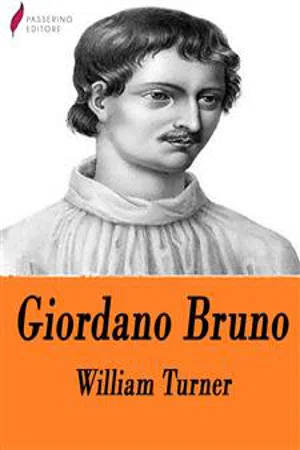
Giordano Bruno
William Turner
- English
- ePUB (mobile friendly)
- Available on iOS & Android
Giordano Bruno
William Turner
About This Book
Giordano Bruno (born Filippo Bruno, 1548 – 17 February 1600) was an Italian Dominican friar, philosopher, mathematician, poet, cosmological theorist, and Hermetic occultist. He is known for his cosmological theories, which conceptually extended the then-novel Copernican model. He proposed that the stars were distant suns surrounded by their own planets, and he raised the possibility that these planets might foster life of their own, a philosophical position known as cosmic pluralism. He also insisted that the universe is infinite and could have no "centre". Starting in 1593, Bruno was tried for heresy by the Roman Inquisition on charges of denial of several core Catholic doctrines, including eternal damnation, the Trinity, the divinity of Christ, the virginity of Mary, and transubstantiation. Bruno's pantheism was also a matter of grave concern, as was his teaching of the transmigration of the soul/reincarnation. The Inquisition found him guilty, and he was burned at the stake in Rome's Campo de' Fiori in 1600. After his death, he gained considerable fame, being particularly celebrated by 19th- and early 20th-century commentators who regarded him as a martyr for science, although historians agree that his heresy trial was not a response to his astronomical views but rather a response to his philosophical and religious views.
Bruno's case is still considered a landmark in the history of free thought and the emerging sciences. William Turner, American Catholic bishop